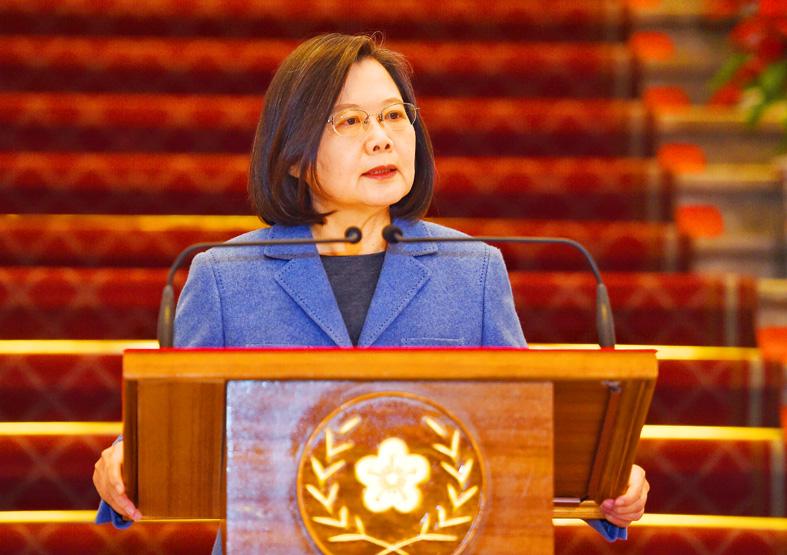The Ministry of Foreign Affairs yesterday welcomed the Halifax International Security Forum’s announcement that it would host its first major event in Asia from Jan. 21 to Jan. 23 next year in Taipei, after it earlier presented a leadership prize to President Tsai Ing-wen (蔡英文).
The Washington-based group of security officials from the world’s democratic states has said it would cohost HFX Taipei with the Institute for National Defense and Security Research.
In May, the group awarded Tsai the 2020 John McCain Prize for Leadership in Public Service in recognition of her handling of COVID-19 and guarding Taiwan’s democracy, which sparked ire from Beijing.

Photo: Liu Hsin-de, Taipei Times
HFX Taipei would be Halifax’s first major meeting in Asia, and underscores that Taiwan is a democratic state and participant in the affairs of the region, the ministry said in a news release.
The ministry would work with Halifax and the institute to ensure the success of the event, which would help Taiwan and like-minded partners defend shared democratic values, it said.
The meeting would be attended by internationally recognized opinion leaders, the institute said in a statement.
Since its establishment by the Ministry of National Defense in 2018, the institute has promoted “think tank diplomacy” with counterparts in other states, including Australia, India, Japan, New Zealand, the UK and the US, as well as European countries, it said.
Democratic Progressive Party (DPP) lawmakers hailed the news as a sign of improving ties with the world’s powerful democracies.
“The [Halifax] think tank is heavily funded by the Canadian government,” DPP Legislator Wang Ting-yu (王定宇) said. “The HFX Taipei forum is effectively a form of semi-official cooperation between the two state-level think tanks.”
Politico had reported that the Canadian government had warned the forum not to give the award to Tsai for fear of angering Beijing. Canada denied the report.
After many US senators and Canadian representatives voiced support for the forum’s decision, it presented the award to Tsai.
DPP Legislator Lo Chih-cheng (羅致政) said the institute would discuss security issues regarding China at the forum.
“This shows that the world’s democracies are coming together to resist totalitarian China,” he said.
That Canadian lawmakers have stood by the forum in honoring Tsai suggests that Canadians’ views on China have changed, he said.
Beijing’s “wolf warrior” diplomacy and saber-rattling is not likely to have an effect on that country, he added.

MAKING WAVES: China’s maritime militia could become a nontraditional threat in war, clogging up shipping lanes to prevent US or Japanese intervention, a report said About 1,900 Chinese ships flying flags of convenience and fishing vessels that participated in China’s military exercises around Taiwan last month and in January have been listed for monitoring, Coast Guard Administration (CGA) Deputy Director-General Hsieh Ching-chin (謝慶欽) said yesterday. Following amendments to the Commercial Port Act (商港法) and the Law of Ships (船舶法) last month, the CGA can designate possible berthing areas or deny ports of call for vessels suspected of loitering around areas where undersea cables can be accessed, Oceans Affairs Council Minister Kuan Bi-ling (管碧玲) said. The list of suspected ships, originally 300, had risen to about 1,900 as

Japan’s strategic alliance with the US would collapse if Tokyo were to turn away from a conflict in Taiwan, Japanese Prime Minister Sanae Takaichi said yesterday, but distanced herself from previous comments that suggested a possible military response in such an event. Takaichi expressed her latest views on a nationally broadcast TV program late on Monday, where an opposition party leader criticized her for igniting tensions with China with the earlier remarks. Ties between Japan and China have sunk to the worst level in years after Takaichi said in November that a hypothetical Chinese attack on Taiwan could bring about a Japanese

MORE RESPONSIBILITY: Draftees would be expected to fight alongside professional soldiers, likely requiring the transformation of some training brigades into combat units The armed forces are to start incorporating new conscripts into combined arms brigades this year to enhance combat readiness, the Executive Yuan’s latest policy report said. The new policy would affect Taiwanese men entering the military for their compulsory service, which was extended to one year under reforms by then-president Tsai Ing-wen (蔡英文) in 2022. The conscripts would be trained to operate machine guns, uncrewed aerial vehicles, anti-tank guided missile launchers and Stinger air defense systems, the report said, adding that the basic training would be lengthened to eight weeks. After basic training, conscripts would be sorted into infantry battalions that would take

DEEP-STRIKE CAPABILITY: The scenario simulated a PLA drill that turned into an assault on Taiwan’s critical infrastructure, with the launchers providing fire support Taiwan yesterday conducted this year’s first military exercises at Longsiang Base in Taichung, demonstrating the newly acquired High Mobility Artillery Rocket System’s (HIMARS) ability to provide fire support and deep-strike capabilities. The scenario simulated an attack on Penghu County, with HIMARS trucks immediately rolling into designated launch areas and firing barrages at the Wangan (望安) and Cimei (七美) islands, simulating the provision of fire support against invading forces. The HIMARS are supposed to “fire and leave,” which would significantly increase personnel and equipment survivability, a military official said. The drill simulated an exercise launched by the Chinese People’s Liberation Army (PLA) Eastern